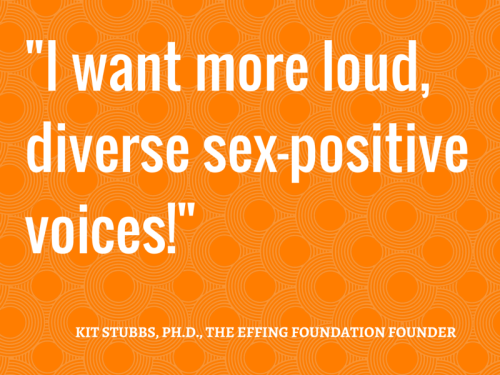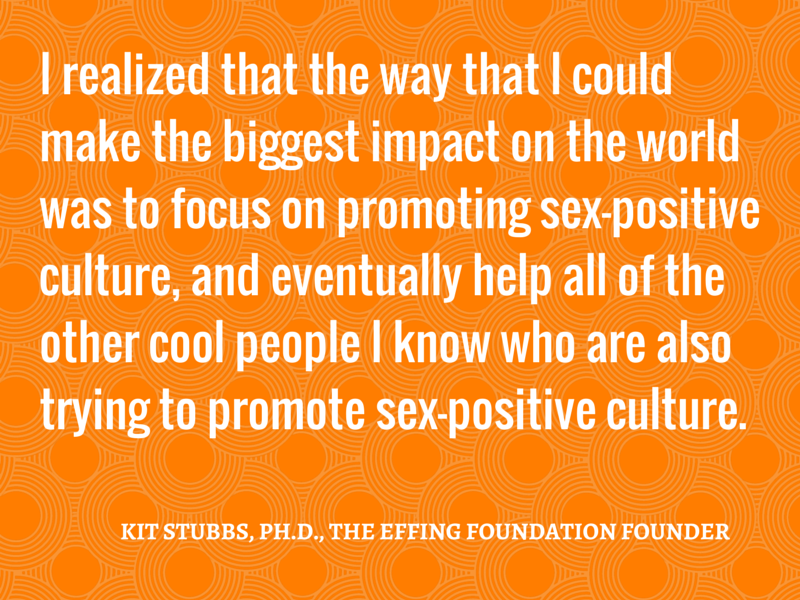|
Local sex-positive mastermind Kit Stubbs, Ph.D., is in the process of launching [drumroll please…] The Effing Foundation for Sex-Positivity! The Effing Foundation aims to foster sex-positive artists, activists, educators, and entrepreneurs, and celebrate diverse expressions of human sexuality. [Full disclosure: Kit and I are friends and we sometimes collaborate on sex-positive projects.] I sat down with Kit to ask them some questions about their plans for the new nonprofit, how they navigate being a sex-positive activist, and what brought them to sex-positivity in the first place. Nicole Mazzeo: What is your vision for the Effing Foundation? Why is it important to you that something like this exists? Kit Stubbs: My vision is to build an organization that provides tools and resources to sex-positive people who are doing cool sex-positive things. I think that in order to affect large scale change (in terms of having a more sex-positive culture) this is really necessary. I have met so many amazing people and … I want their voices to be louder. I want more loud, diverse sex-positive voices! And I think the way to do that is to build an organization whose entire mission is to support those people and to encourage more people to do sex-positive outreach. NM: What is The Effing Foundation’s first project? KS: Our first major initiative is launching what we call a crowd-directed grantmaking platform. Effectively, it will look like a sex-positive crowdfunding site. What happens is someone who has a sex-positive project idea submits a grant application to us, and that application looks very similar to the information you would need to provide to a mainstream crowdfunding site. Our nonprofit reviews the application, to see if it’s in line with our mission — if it’s sex-positive, if it treats people respectfully, and if the project creator looks like they will be able to execute the project if it is funded. If we approve the project, then the project launches as a fundraising campaign. And people will pledge money to our nonprofit in support of that specific project. If enough pledges are received, then we collect the pledges, and The Effing Foundation gives a grant to the project creator (minus a small fee to help sustain our organization). NM: What’s the need for this project? KS: Right now it can be very difficult for people doing sex-positive work to find funding to support that work. Most mainstream crowdfunding sites will not accept sexually explicit projects. And even those that do have restrictions. I’ve also seen crowdfunding platforms cancel projects run by sex-positive people, sex workers in particular, even when the project itself had nothing to do with sex. We need a way for any sex-positive project creator to raise money independent of anything else. Combining money and sex is really complicated in our society, but sex-positive artists, activists, educators and entrepreneurs need money in order to be able to support themselves and do their work. So a platform that makes it possible to get financial resources to these people is our top priority. NM: When do you expect to launch the crowdfunding site? KS: Ah yes. If there’s one thing I have learned in the past three years of doing this startup, it is that estimating time is virtually impossible. I hope that we will be launching the platform in 2016, but I don’t know how soon it will be. NM: Are there any other Effing Foundation projects in the works? KS: We have a ton of ideas! And if we can raise the money to hire the staff to help make them happen, there are a lot of things we’d love to do. We would love to offer instructional materials for people just starting to do sex-positive businesses. Trying to start a new business in this space can be very challenging. We would also love to launch a sex-positive version of Etsy — a marketplace specifically designed for sex-positive people and their projects. I personally would love to see a sex-positive version of instructables.com for people who want to learn DIY crafting and toymaking. So yeah, we have huge plans, and depending on the resources we can raise in terms of money and volunteers, we’ll do as much of that as we can. NM: How did you become passionate about sex-positivity? KS: There was sort of a combination of things. First, I started blogging about my experiences growing up in a very sex negative environment. The positive responses that I got back from other people saying that they understood, they had had very similar experiences — that was really powerful. Then, about five years ago, I was starting to meet a lot more people who were kinky and poly and transgender. I started doing a lot of thinking about my own gender and sexuality and what was important to me. Around that time I also started volunteering with Artisan’s Asylum, which is a local community makerspace. I was overwhelmed with the variety of tools and awesome people doing tons of cool projects. I knew I wanted to be a part of the community, but I didn’t know what I was going to make. And then, finally, one day I just realized: Oh! I want to make sex toys and BDSM equipment! And then suddenly I had all of these ideas, and I got to start playing with them. And as I started sharing my work with other people, both at the makerspace and online, I started to realize how important sex-positivity is. Watching people’s responses to my toys, which was overwhelmingly positive and encouraging, and people wanted to know how to make their own toys — that excitement really encouraged me. Then I started going to a conference called Arse Elektronika, which is a sex tech conference. I started meeting a lot of other really cool people who are also sex-positive, very open about their interest in sexuality, and so then after a while, I realized that I wanted to help all of them be able to have an even greater impact with their work. And after a while making toys and prototypes, I realized that the way that I could make the biggest impact on the world was to focus on promoting sex-positive culture, and eventually help all of the other cool people I know who are also trying to promote sex-positive culture. NM: The sex-positive movement is sometimes criticized for being dominated by white middle class people, especially young women. Do you have a strategy for making The Effing Foundation more inclusive to diverse people?
KS: I’ve tried to recruit a board that is more diverse. We are mostly white, but we are not all white, and we do cover a range of genders and sexual identities and relationship styles. I want to set up an advisory board, and I’ll be reaching out to a whole variety of educators and activists for that. I will be trying really hard to recruit transfolk, people of color, people with disabilities. I want to help build sex-positivity across a variety of communities. As our initiatives are ready to be used by sex-positive folks, I will be explicitly reaching out to as many different types of sex-positive folk as I can find. I recognize that I have a lot of privilege in being able to do this. I can use the name on my driver’s license. I’m able to do this full time because my husband and I have the financial resources for me to be able to do this. I’m well educated. I want to try and use the privilege that I have to help other people from a lot of different communities. NM: Do you ever have to hide your work in other aspects of your life? KS: If someone asks me straightforwardly what I do, I try really hard to be honest. But depending on who it is and what the context is, I might phrase it in a slightly different way. I try not to push my beliefs onto people. But if someone does ask what I do, I might say, you know, I’m launching a nonprofit to promote sexual wellness. And if someone is interested and they want to hear more, I’m happy to share that. But if the person looks uncomfortable, or they look like they’re trying to take the conversation somewhere else, that’s also fine. This is definitely something I struggle with, because I want to be able to tell everyone. And it isn’t always easy. Only a couple members of my family know. I’m pretty open on the internet about what I do, so if someone in my family googles me they will eventually find this work. Someday I hope to tell more of my family members about what I do, but that would take a lot of emotional energy that I don’t have right now. So yeah, it’s often easier for me to tell complete strangers. I’ve started coming out to a lot of my friends from grad school, who have been really supportive. And that’s been great. [laughs] I made a conscious decision not to hide what I do especially online, knowing that it might have consequences for some of my relationships, particularly with family in the future. But overall, I am much happier the more open I can be about who I am and what I do. And again, that is a privilege. But if it’s possible for me to be that open, and try and promote a more open environment, then I’m happy to do that. I never look down on people who use pseudonyms or remain anonymous, because I know not everybody can do what I do. The more people who can be openly sex-positive, I think that hopefully will help make change so that even more people can be openly sex-positive. NM: Do you receive any pushback for your work? If so, how do you manage it? KS: So far I have been very fortunate. In a lot of ways, I live in a bubble. I am surrounded with a supportive husband, and lots of supportive friends. I live in a city that’s very progressive. So for the most part the feedback that I have received has been very positive. That said, I certainly have received some negative comments on my blog, which I just delete. And occasionally some people mistake my sex-positivity as being sexually available. I’ve had some very awkward moments as a result. I talked about that at a hacker’s conference last summer. I actually put up a slide with a flow chart explaining how I would not have sex with the people in the room. They were a great audience, and they stuck with me, and I could explain about how boundaries are important. And that ended up going so much better than I had anticipated. I was really afraid. Comments are closed.
|



